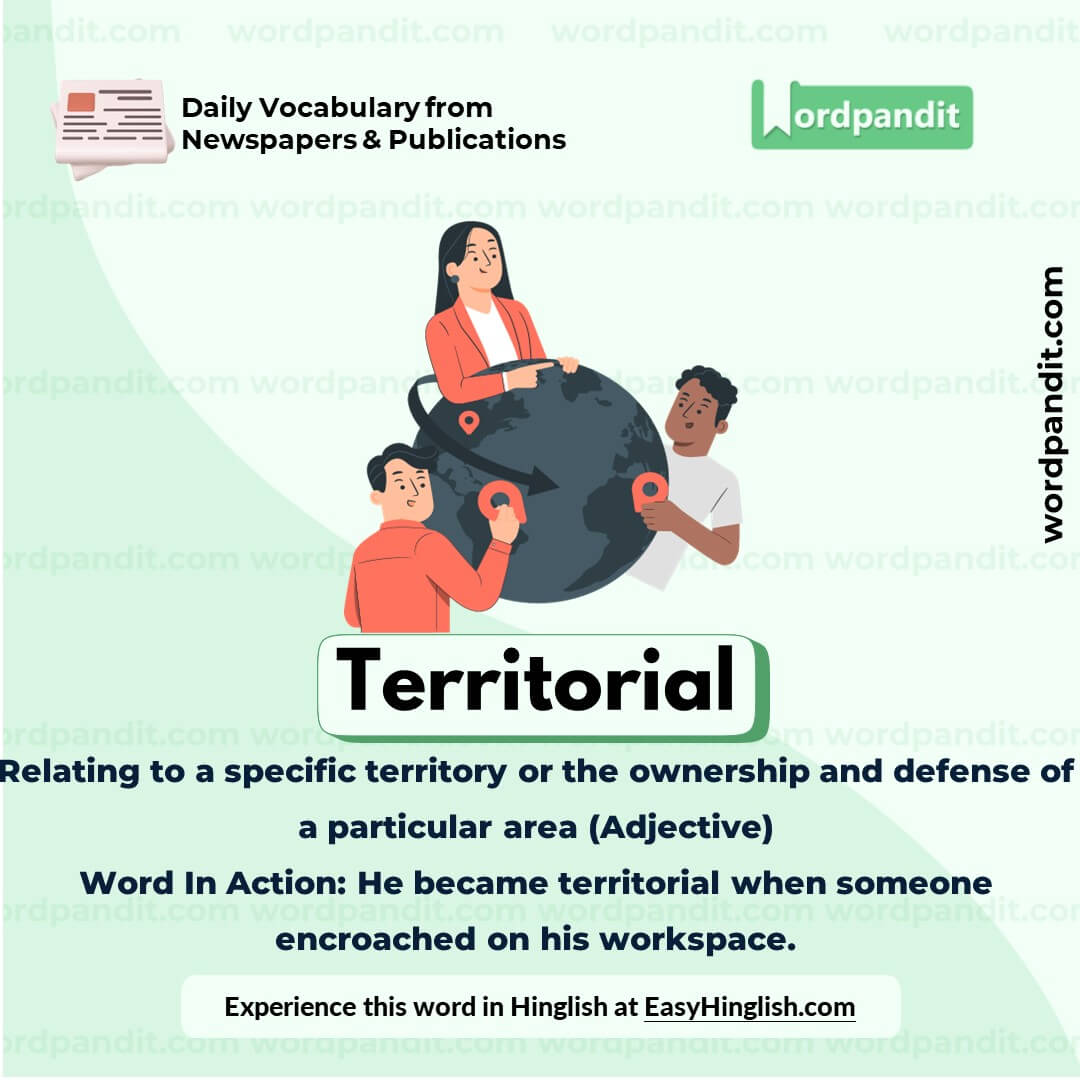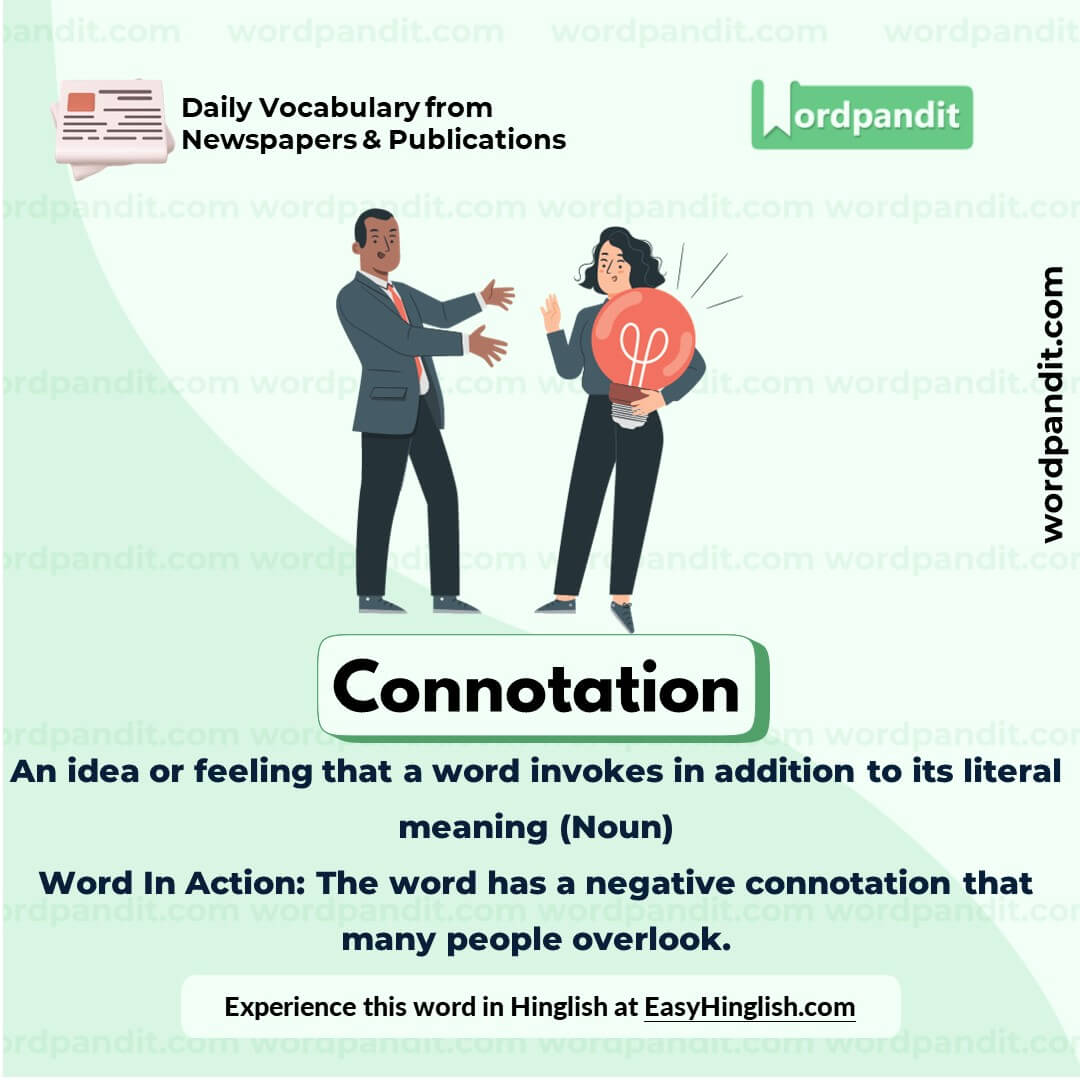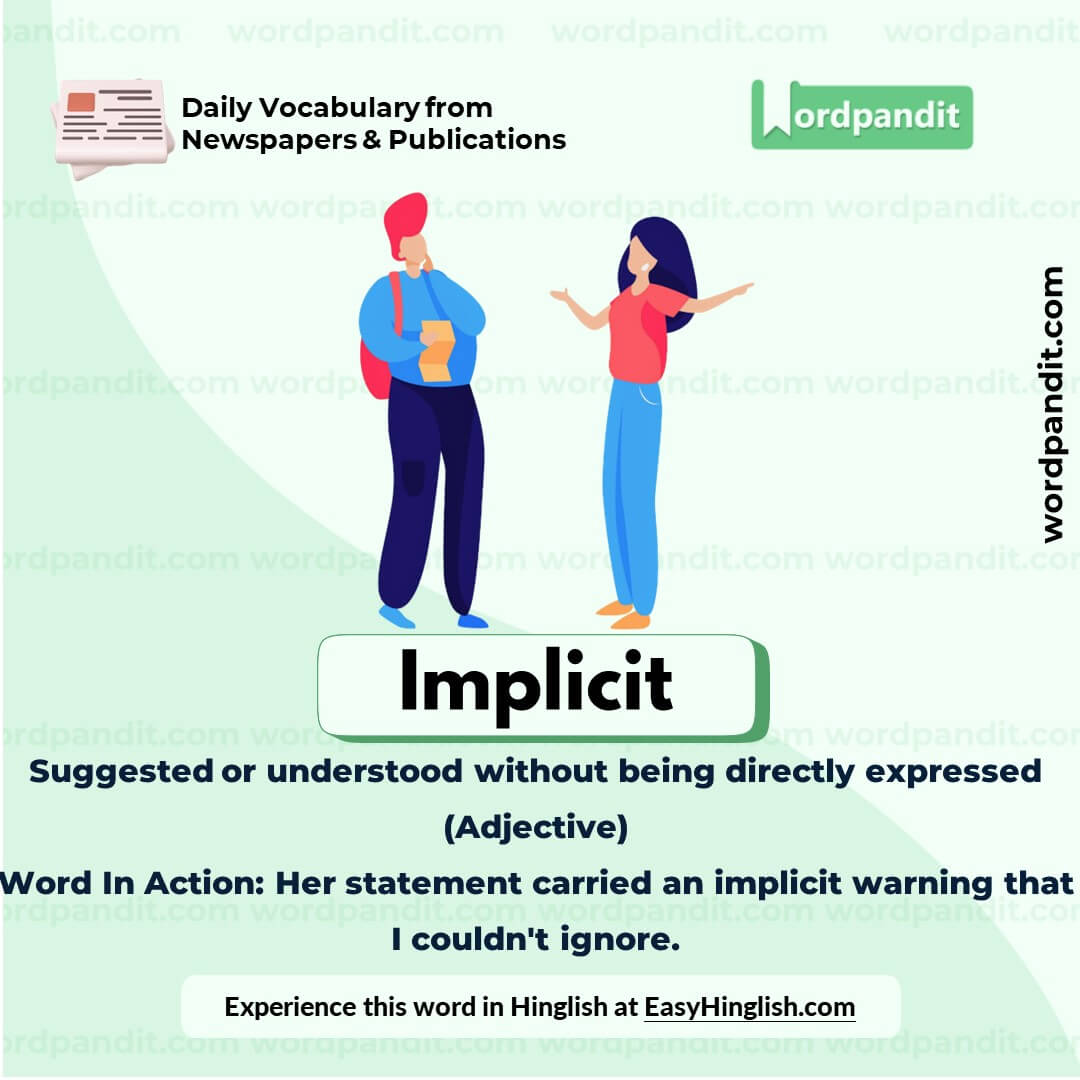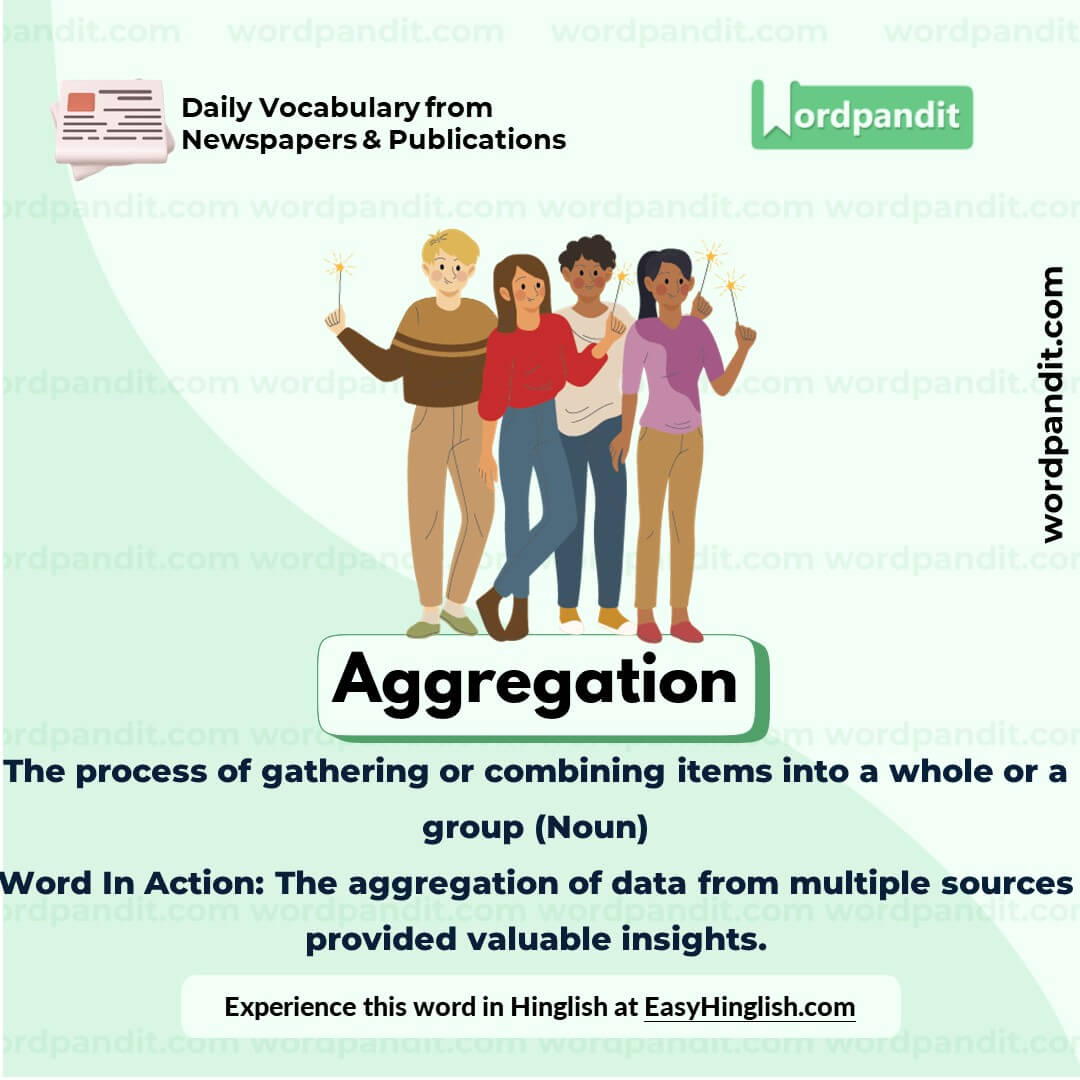Daily Vocabulary from Indian Newspapers and Publications
Welcome to Wordpandit’s Indian Vocabulary Hub
At Wordpandit, we understand the importance of staying rooted in the local context while expanding your language skills. This section focuses on enriching your vocabulary with words and phrases drawn from India’s leading newspapers and publications, ensuring you're learning vocabulary that is practical, relevant, and uniquely Indian.
Why Indian Sources Matter
We believe that the best way to master any language is by immersing yourself in local content. That’s why we carefully curate vocabulary from top Indian publications, including:
- The Hindu
- The Times of India
- The Economic Times
- Hindustan Times
- Live Mint
- The Indian Express
- And many others...
Stay Updated, Stay Relevant
With daily updates from Indian news sources, you’ll be consistently learning words that reflect the trends and shifts in Indian society and culture. Our focus is to provide vocabulary that enhances your understanding of the language in an Indian context.
How Wordpandit Supports Your Goals
Whether you’re preparing for exams, aiming to improve your professional communication, or simply want to stay connected with the latest Indian vocabulary, Wordpandit is here to guide you every step of the way.
Learn with a Practical Approach
Our interactive learning methodology includes real-world examples, engaging activities, and context-specific usage to ensure that every word becomes part of your active vocabulary.
Dive into Indian Vocabulary Today!
Why Choose Wordpandit?
Practical Learning: Focus on words you'll actually encounter in real-world reading, enhancing your comprehension and communication skills.
Diverse Content: From current affairs to scientific breakthroughs, our varied sources expose you to vocabulary across multiple domains.
Effortless Integration: Make Wordpandit a part of your daily routine. Just a few minutes each day can significantly boost your lexicon over time.
Your Path to Vocabulary Mastery
- Visit our Daily Vocabulary section regularly
- Explore new words and their usage in context
- Practice incorporating these words into your own writing and speech
- Track your progress as your vocabulary expands
Start Your Journey Today
Embark on your vocabulary enhancement journey with Wordpandit. By consistently engaging with our daily posts, you'll build a robust vocabulary that serves you well in academic, professional, and personal contexts.
Remember, a word a day keeps linguistic limitations at bay. Make Wordpandit your daily companion in the quest for vocabulary excellence!
WORD-1: Territorial
Context:
"Freedom is a birthright of individuals, and families. It has no territorial connotation and presupposes democracy. Independence, on the other hand, relates not to control over our lives, but to control over territory." - The Wire
Explanatory Paragraph:
The word "territorial" refers to anything related to a specific geographic area or territory. It can also describe behaviors or attitudes concerned with maintaining control or ownership over a particular space, whether physical or metaphorical. In discussions about politics, governance, or even animal behavior, the concept often relates to defending or asserting boundaries.
Meaning: Relating to a specific territory or the ownership and defense of a particular area (Adjective)
Pronunciation: ter-ri-toh-ree-uhl
Difficulty Level: ⭐⭐⭐ Intermediate
Etymology: Derived from Latin "territorialis," based on "territorium," meaning land or district.
Synonyms & Antonyms:
Synonyms: Regional, zonal, jurisdictional, defensive
Antonyms: Universal, non-regional, unrestricted
Usage Examples:
- The territorial dispute between the two nations remained unresolved for decades.
- Many animals exhibit territorial behavior, especially during mating season.
- The company sought to expand its territorial reach into untapped markets.
- The law ensures the territorial integrity of the state is preserved.
Cultural Reference:
"The Treaty of Versailles in 1919 imposed territorial restrictions on Germany, significantly altering its borders." - Historical Context
Think About It:
How do territorial disputes shape the relationships between nations, and what strategies can be used to resolve them peacefully?
Quick Activity:
Identify a recent news story about a territorial conflict. Write a short summary explaining the key issues involved.
Memory Tip:
Think of "territorial" as a blend of "territory" and "real," emphasizing something very specific to a defined area or space.
Real-World Application:
The concept of territorial rights is crucial in international law, defining the boundaries within which a government has sovereignty. It also applies to businesses seeking market expansion and environmental preservation strategies for protected areas.
WORD-2: Connotation
Context:
"Freedom is a birthright of individuals, and families. It has no territorial connotation and presupposes democracy. Independence, on the other hand, relates not to control over our lives, but to control over territory." - The Wire
Explanatory Paragraph:
The term "connotation" refers to the emotional, cultural, or symbolic associations that a word or phrase carries beyond its literal definition. While the denotation of a word is its explicit meaning, connotations add depth, evoking feelings or ideas based on context and individual interpretation. For example, the word "home" denotes a place where one lives but connotes warmth, comfort, and family.
Meaning: An idea or feeling that a word invokes in addition to its literal meaning (Noun)
Pronunciation: kon-noh-tay-shuhn
Difficulty Level: ⭐⭐⭐ Intermediate
Etymology: Derived from the Medieval Latin "connotatio," meaning "significance," from "connotare," which means "to mark alongside."
Synonyms & Antonyms:
Synonyms: Implication, undertone, nuance, suggestion
Antonyms: Denotation, explicit meaning, definition
Usage Examples:
- The word "childish" has a negative connotation, while "childlike" is more positive.
- Colors often carry connotations; for instance, red can signify love or anger.
- The speech’s connotations stirred a sense of hope and unity among the listeners.
- Advertisements often use words with positive connotations to appeal to emotions.
Cultural Reference:
"In literature, words with rich connotations can create vivid imagery, as seen in Shakespeare’s plays, where a single word can carry multiple layers of meaning." - Literary Analysis
Think About It:
How do the connotations of words influence public perception in political speeches or media headlines?
Quick Activity:
Write down five words related to "freedom" and list their connotations. Reflect on how each one makes you feel or think differently.
Memory Tip:
Remember "connotation" as the emotional "connection" a word carries, going beyond its dictionary definition.
Real-World Application:
In marketing, understanding the connotations of words helps create impactful slogans and campaigns. Similarly, in diplomacy, word choice is critical to convey the intended tone and message.
WORD-3: Implicit
Context:
"Agnihotri was within his rights to refuse, but the tone of his reply, which was belligerent and defensive, was an implicit admission of defeat." - The Wire
Explanatory Paragraph:
The word "implicit" refers to something that is suggested or implied rather than explicitly stated. It represents an idea or meaning that is understood without being directly communicated. For instance, when someone gives an implicit warning, they hint at consequences without outright stating them.
Meaning: Suggested or understood without being directly expressed (Adjective)
Pronunciation: im-plis-it
Difficulty Level: ⭐⭐⭐ Intermediate
Etymology: Derived from Latin "implicitus," meaning "entwined" or "involved," from "plicare," meaning "to fold."
Synonyms & Antonyms:
Synonyms: Implied, unspoken, suggested, indirect
Antonyms: Explicit, stated, direct, clear
Usage Examples:
- The teacher’s silence was an implicit approval of the students’ proposal.
- Her actions carried an implicit message of disapproval, even though she didn’t say a word.
- The contract contained an implicit agreement that both parties would act in good faith.
- The implicit threat in his words made everyone uneasy.
Cultural Reference:
"Implicit bias refers to the attitudes or stereotypes that affect our understanding, actions, and decisions unconsciously, a concept widely discussed in social psychology and diversity training." - Social Studies
Think About It:
Why do you think implicit communication is sometimes more effective than explicit statements in sensitive situations?
Quick Activity:
Think of a time when someone implied something without directly saying it. Write down what they said and what you understood implicitly.
Memory Tip:
Remember "implicit" by associating it with "implied." Both words share the idea of something being suggested rather than directly stated.
Real-World Application:
Implicit communication plays a vital role in diplomacy, relationships, and negotiations, where subtlety can prevent misunderstandings and foster better understanding.
WORD-4: Acceded
Context:
"He graciously acceded to our request." "The government was forced to accede to their demands." - The Wire
Explanatory Paragraph:
"Acceded" is the past tense of "accede," which means to agree to a request, demand, or proposal, often after some initial hesitation or resistance. The term can also refer to assuming a position of power or responsibility, such as acceding to a throne. It often implies a degree of formality or diplomacy in the agreement.
Meaning: To agree to a request or demand; to assume a position of power (Verb)
Pronunciation: ak-seed-ed
Difficulty Level: ⭐⭐⭐ Intermediate
Etymology: From Latin "accedere," meaning "to go to or approach," derived from "ad-" (to) + "cedere" (to go).
Synonyms & Antonyms:
Synonyms: Agreed, consented, accepted, complied
Antonyms: Refused, denied, rejected, opposed
Usage Examples:
- The new president acceded to the demands for transparency in government operations.
- After much deliberation, the council acceded to the proposal for urban development.
- She acceded to the role of team leader after her predecessor resigned.
- The king acceded to the throne following his father's abdication.
Cultural Reference:
"In international relations, acceding to treaties or agreements often requires extensive negotiation and diplomacy." - Global Studies
Think About It:
Why might someone hesitate before acceding to a request or demand? How does context influence the decision to accede?
Quick Activity:
List three scenarios where a leader might accede to demands. Discuss the potential consequences of their decision.
Memory Tip:
Think of "accede" as "accept + proceed," where you accept a request or demand and move forward with it.
Real-World Application:
"Acceded" is commonly used in political, legal, and diplomatic contexts where agreements or compromises are reached, reflecting the nuances of formal negotiation processes.
WORD-5: Aggregation
Context:
"In aggregation functions, the calculation context defines the data scope used as the source for the aggregation." - The New Indian Express
Explanatory Paragraph:
"Aggregation" refers to the process of collecting or combining multiple elements into a single group or total. In data analysis and mathematics, it often involves summarizing information, such as calculating the sum, average, or other metrics from a dataset. The concept is widely used in computing, business, and science to analyze and interpret complex data efficiently.
Meaning: The process of gathering or combining items into a whole or a group (Noun)
Pronunciation: ag-gri-gay-shuhn
Difficulty Level: ⭐⭐⭐ Intermediate
Etymology: Derived from Latin "aggregatio," from "aggregare," meaning "to add to a flock or group," combining "ad-" (to) and "gregare" (to flock).
Synonyms & Antonyms:
Synonyms: Collection, compilation, accumulation, assemblage
Antonyms: Separation, division, segregation, fragmentation
Usage Examples:
- The aggregation of data from various sources provided a comprehensive view of the market trends.
- In biology, aggregation refers to the clustering of cells or organisms in a specific area.
- The system performs aggregation to generate monthly sales reports automatically.
- The teacher encouraged the aggregation of ideas during the brainstorming session.
Cultural Reference:
"In modern journalism, news aggregators compile articles from different sources, offering a wide range of perspectives in one platform." - Media Studies
Think About It:
How does aggregation help simplify complex systems in fields like technology, biology, or economics?
Quick Activity:
Find an example of data aggregation in daily life, such as a weather app or a financial dashboard, and describe how it improves decision-making.
Memory Tip:
Think of "aggregation" as "adding + generation," where items are added together to generate a summary or whole.
Real-World Application:
Aggregation is widely used in technology, such as in machine learning for feature engineering, in business for customer data analysis, and in environmental science for climate data modeling.
















